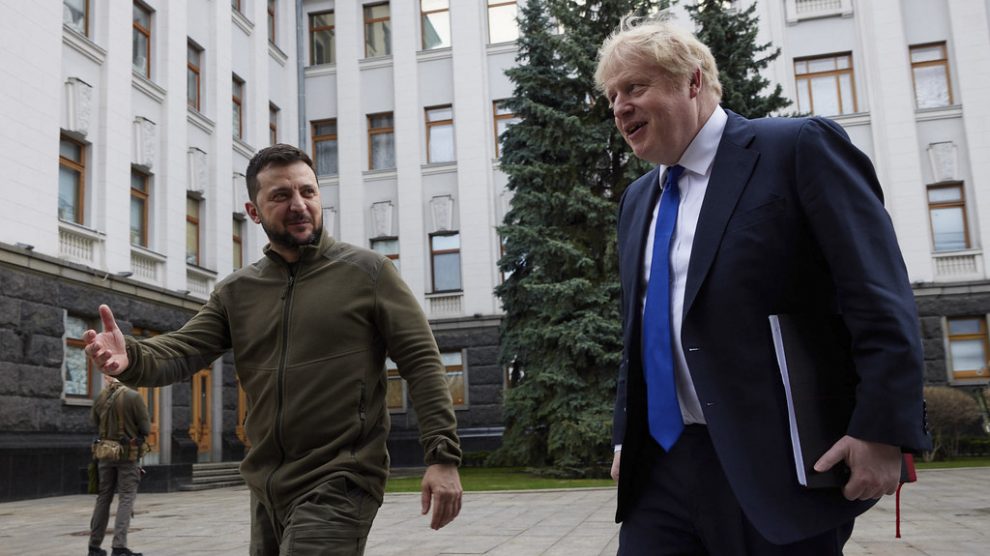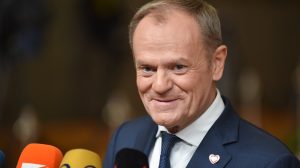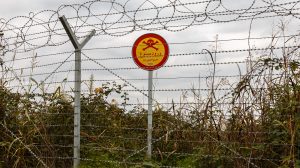Sportswashing is real, Ukrainewashing is not. There may be benefits for countries and politicians backing Kyiv, but these are not the primary motives behind their support.
A month ahead of the FIFA World Cup kicking off in Qatar on November 20, the subject of sportswashing is as relevant as ever.
In the case of Qatar, it could be argued that the intense focus placed on the country – notably its by now well-documented disregard for the rights of the many thousands of migrant workers who built the stadiums in which the tournament will be played – has backfired.
- Russia’s war on Ukraine is increasing child poverty across Eastern Europe and Central Asia
- For ‘nonperforming’ Belarus, problems mount
- Why the Nobel Peace Prize angered some Ukrainians
For others, however, sportswashing (simply the practice of an individual, company or country using sport to clean a stained reputation or simply to distract public attention from something nasty), has been more successful.
Russia, which hosted the previous World Cup in 2018 as well as the Winter Olympics of 2014, used those events to introduce travellers to a wide range of cities, some of which had never really been thought of as potential tourist destinations, at least by visitors from outside of the country.
Sportswashing works best when independent commentators and analysts become unwitting ambassadors.
In a now famous piece of commentary during that 2018 World Cup, former Scottish international Ally McCoist, working for the BBC, waxed lyrical about the city of Kazan: its religion, architecture, history and culture.
“Kazan has come a long way since it fell to Ivan the Terrible in 1552,” said McCoist, who went on to describe the beauty of the city’s mosques and how amazed the people living there hundreds of years ago would have felt if they witnessed the development that has made it what it is today.
Baku, the capital of Azerbaijan, is another sportswashing success story. Since 2017 it has hosted a Formula 1 Grand Prix, where focus has been on the glitz and glamour that surround motor racing rather than the many human rights abuse and corruption that otherwise characterise the country.
Saudi Arabia has invested heavily in sports in recent years, buying a Premier League football club, Newcastle United, and sponsoring a new professional golf tour, LIV. The Gulf state has also let it be known that it wants to host the Olympic Games in the future.
Ukrainewashing
The prevalence of sportswashing has in recent months led to suggestions that certain countries, politicians and companies are taking part in what has been termed Ukrainewashing, or warwashing.
The former UK prime minister, Boris Johnson, twice visited Ukraine at times of great strife at home. Few would bet against his embattled successor, Liz Truss, turning up in Kyiv one day soon.
But the suggestions that such visits constitute Ukrainewashing are baseless. For all his many, many faults, Johnson’s commitment to Ukraine was real; the same is true for Truss.
Poland has likewise been a staunch ally of Ukraine from the first days of the Russian invasion. It has welcomed, and continues to host, hundreds of thousands of displaced people. It has supplied Ukraine with arms and munitions, while the east of Poland has become a vital logistics hub for the transport of aid.
At various international organisations, including the European Union, Warsaw has offered Kyiv resolute diplomatic support. In May, Poland’s president, Andrzej Duda, was the first foreign leader to address Ukraine’s parliament since the start of Russia’s war.
As a result, Poland’s international reputation – in recent years dominated by criticism of its justice system, abortion rights, ‘LGBT-free’ zones, coal addiction and media freedom – has very quickly been, if not fully restored, then certainly well-polished.
For while the Warsaw government remains locked in dispute with the European Union – just this week Brussels said that it was ready to freeze payments of regional aid because of threats to judicial independence – external criticism of Poland, notably from the United States, has been muted.
But as was the case with Boris Johnson, Poland’s support for Ukraine is unquestionably genuine and unconditional. Like the three Baltic states – Estonia, Latvia, Lithuania – Poland views Russia’s invasion of Ukraine as an existential threat. If Ukraine falls, Poland (or one of the Baltic states) will be next.
As such, it would be wrong to label Poland’s behaviour as Ukrainewashing, or warwashing. Warsaw will gratefully accept any fringe benefits, but they are not the purpose of the exercise, which is to help ensure Ukraine defeats Russia.
Realignment
Instead of Ukrainewashing, what we are witnessing therefore is a temporary realignment of political priorities.
Italy’s likely new leader, the right-wing populist Giorgia Meloni, has been criticised for comments on any number of issues from migration to LGBT+ rights, but her stance on Ukraine – she has committed to offering Kyiv Italy’s continued support – has been commended.
For most European politicians, right now that is what matters most. Any number of democracies in Central and Eastern Europe – and not a few in Western Europe – may be flawed at present, but there is a growing consensus that dealing with these issues is a battle for another day.

No time for cynicism
This has left the EU’s most illiberal and flawed democracy, Hungary, isolated. Its prime minister, Viktor Orbán, has consistently opposed EU sanctions against Russia. Its foreign minister, Péter Szijjártó, remains a regular visitor to Moscow. Hungary is currently in the process of organising an informal “national survey”, a quasi-referendum designed to show that Hungarians want energy sanctions lifted.
Even Poland, an erstwhile ally, has disowned Hungary. The Visegrád Group (V4), which also includes Czechia and Slovakia, has been rendered little more than a talking shop. Poland and Hungary may continue to share a deep suspicion of the EU and everything that emanates from Brussels (except, perhaps, money) but will not be reconciled until either the war against Russia in Ukraine is won, or Hungary changes course.
Should the war continue for any great length of time, Ukrainewashing may one day become a genuine phenomenon. But it is likely to be limited to the corporate world, as companies with otherwise dubious environmental, social, governance (ESG) practices look to launder their reputations by offering aid to Ukraine.
For countries however, not least those who view Russia as a threat to their peace and security, the stakes are too high to play such cynical games.
Photo: Then UK PM Boris Johnson in Kyiv with Ukrainian President Volodymyr Zelensky in April. (10 Downing Street).
Unlike many news and information platforms, Emerging Europe is free to read, and always will be. There is no paywall here. We are independent, not affiliated with nor representing any political party or business organisation. We want the very best for emerging Europe, nothing more, nothing less. Your support will help us continue to spread the word about this amazing region.
You can contribute here. Thank you.







Add Comment